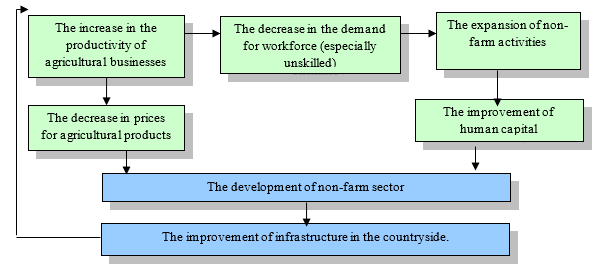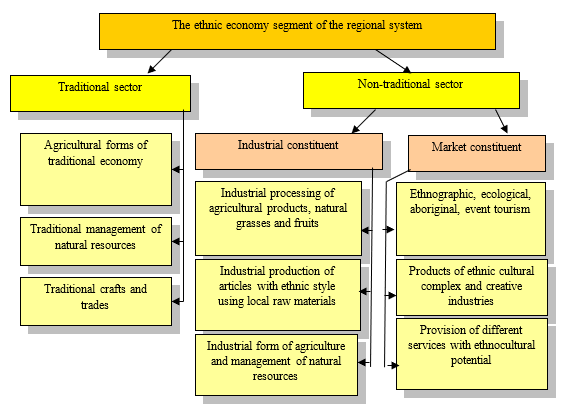Abstract
The article is devoted to the ethnic economy – a special sector of our economy which contains a dormant potential of southern subregions of Russia. The ethnic economy of the Southern macroregion is able to embrace innovations, be a vector for big investment processes and become a basis for entrepreneurship development. It was found during the study that the ethnic economy acts as a structural frame for the agricultural sector of the economy in the Southern macroregion. The authors have identified a tendency which shows that the number of agricultural enterprises is increasing. Traditional management of natural resources gave way to agricultural businesses. The study shows that ethnic economy in the region should be taken into account at the meso-level in terms of a growth model shift. Also, the comparison between the structure of the economy combined with its dynamics and the national average shows that economic systems of the Southern macroregion are agriculturally oriented. In the current economic situation the development of the agricultural sector in the Southern macroregion is most appropriate on the basis of integration, cooperation, and creation of manufacturing spatial units. The development of agricultural cities in the Southern microregion is an innovation that stimulates the inflow of investments in new and modernized enterprises. Agricultural cities will allow growing ecologically clean products, giving a possibility to become a leading supplier of fruits and vegetables. Suggestions and recommendations concerning the creation of agricultural cities enhance transformation processes, aimed at innovative development of the Russian economy.
Keywords: Ethnic economythe potential of a territorysubsistence farming
Introduction
The agricultural sector is the most important in the economy of the Southern macroregion. The revival and development of this sector give both objective and subjective preconditions for the growth of employment, social and economic stability as well as food security in the majority of subregions.
The current financial crisis has stimulated Russian macroregions to search for new vectors of development via organizational and economic solutions, rational use of natural resources and human capital, search for new income sources and the revival of economic activities of some ethnic groups based on traditional activities, i.e. ethnic economy (Zakharova & Borovkina, 2011; Zakharova & Bartashevich, 2011; Klochko & Prokhorov, 2016). Thus, the ethnic economy is a real and meaningful element of economic structure in the Southern macroregion where the combinations of traditional aspects of lives and activities are formed as a result of regional reproduction based on labour customs, manufacturing experience, culture and mentality of an ethnic group.
Problem Statement
The ethnic economy of the Southern macroregion can embrace innovations, be a vector for big investment processes and become a basis for entrepreneurship development. To increase income and the rate of employment, save traditions and customs it is necessary to develop ethnic entrepreneurship as one of the perspective spheres of ethnic economy in the macroregion. Of interest is the relationship between the efficiency of entrepreneurship in the countryside and the improvement in the human capital, identified by Michailova and Zamyatina (2006) (fig. 1).

Ethnic economic is a promising direction for the development of the Southern macroregion. It is characterized by the agricultural forms of business. The territories of national republics and autonomous regions account for more than 50% of resources and about 20% of the population of Russia. Closely connected segments of the ethnic economy are represented in figure
Ethnic economic has a favourable impact on the development of the Southern macroregion because it:
– plays the role of a structural frame for the agricultural sector of the economy in the macroregion;
– forms local clusters, connected by common interests and developing complementary sectors and subsectors of the ethnic economy;
– generates the entrepreneurship potential of ethnic groups living in the territory of macroregions;
– allows using human capital effectively by creating special territorial “zones” for this purpose;
– mitigates the negative impact of crisis situations on the regional economy.

Research Questions
The subject of this research is economic relations appearing in the process of transformation of the ethnic economy in the Southern macroregion in the current context of systemic changes.
Purpose of the Study
The aim of this research is to identify the potential of agricultural cities in the economy of the Southern macroregion.
Research Methods
The methodology that forms the basis for the theoretical model of ethnic economy functioning in the economic sphere of the territory was formulated in the works by Kolesnikov (2017), Ovchinnikov and Ketova (Ketova & Ovchinnikov, 2014; Ovchinnikov & Ketova, 2016). The ethnic economy aspects of economic system development in the context of globalization were covered in the works of Akhmetov (2017, 2018), Panikarova (2011), Pechura (2012), Sadovoy (2018). We must note the diversity of approaches used to describe certain sides of the research theme in the works. However, the theoretical, methodological and applied aspects of research in the ethnic economy as a component of a meso-level economic system localised in particular territory is still on the periphery of research.
The article uses systematic, monographic, structural and logical methods of research. Each method is used with respect to its functionality.
Findings
Usually, the ethnic economy is not taken into account during the elaboration of the development strategy for the Southern macroregion. This is because the ethnic economy is a non-visible entrepreneurship sector which is hard to identify due to a big volume of small-scale and subsistent forms of production as well as broad use of domestic labour.
Let’s evaluate the weight of human capital in the economy of the Northern Caucasus federal area (table
The analysis of activities in the traditional sector of the ethnic economy (table
The study shows that ethnic economy in the region should be taken into account at the meso-level in terms of a growth model shift. Also, the comparison between the structure of the economy combined with its dynamics and the national average shows that economic systems of the Southern macroregion are agriculturally oriented. The agricultural orientation is supported not only by traditional ideas of favourable natural and climatic factors and historical specializations but the indicators of industry development in most republics, where there is a positive potential of the ethnic economy.
The development of the agricultural sector in the Southern macroregion is most appropriate on the basis of integration, cooperation, and creation of manufacturing territorial units. Such types of territorial associations provide the qualitative changes in the system of reproduction and are a condition for effective cooperation of such systems as manufacturing, processing, selling and finance, and credit institutions. Besides enterprises, such associations include local societies. This creates additional win-win relationships between enterprises and population.
The agricultural sector in the Northern Caucasus federal area is suitable for cluster entities and agricultural holdings. Foreign experience supports the existence of effective cluster entities in the agricultural business: winemaking cluster in the state of California, wine and cognac cluster in France, milk cluster in Denmark, cheesemaking cluster in Switzerland, grain clusters in Canada and the USA (Kolesnikov & Darmilova, 2018; Perova, 2016).
The synergetic effect of such associations is especially important at the meso-level, where so-called “development vectors” should be formed. A vector contributes to the appearance of agricultural zones that can become agricultural cities in the future. This will bring cost reduction and increase in productivity due to the integration of activities of companies, located near each other. Schumpeter called such association an agglomerate (Schumpeter, 1995).
Conclusion
The development of agricultural cities in the Southern microregion is an innovation that stimulates the inflow of investments in new and modernized enterprises. Agricultural cities will allow growing ecologically clean products, give a possibility to become a leading supplier of fruits and vegetables, provide food security for the republics of North Caucasus. The creation of agricultural cities influences on main constituents of regional economic growth: technological, social, economic and resource-related. Also, considering the multi-ethnic specialization of the Southern macroregion it is necessary to take into account the influence of ethnic economy. A multi-ethnic region can use its competitive capacity only when supported by self-development mechanism of regional ethnic societies that seek to increase the effectiveness of their business activities.
The search for additional income sources and employment opportunities for the population as well as optimal organizational and economic solutions and creation of agricultural citifies based on the ethnic economy potential, which could lead the Southern macroregion out of the crisis, needs a strategy of development for 15–20 years in which local specialists, such as government authorities, business people and scientists, can participate. However, it is necessary to remember that experts who don’t know the ethnic characteristics and mentality of local people may harm the social and economic development of the economy in the territory.
References
- Akhmetov, V. Ya. (2017). The role of ethnic entrepreneurship and ethnic cooperation in the preservation and revival of the Russian village (on the materials of the Republic of Bashkortostan) Biosphernoe khoziaystvo: teoriya i praktika, 2, 40.
- Akhmetov, V. Ya. (2018). Ethnic business and its role in a development of economy of the modern village. Economica selskogo khoziaystva v Rossii, 5, 77.
- Ketova, N. P., & Ovchinnikov, V. N. (2014). Strategy for innovative resources capitalization in peripheral regions of Russia, given its limited nature. Terra Economicus, 1, 92.
- Klochko, E. N., & Prokhorov, V. V. (2016). Potential of ethnoeconomy of the Southern macroregion in development of agrogorod, as production and technological spatial innovation. Problem of economy and legal practice, 4, 64.
- Kolesnikov, Y. S., & Darmilova, Z. D. (2018). Traditional economic structures as the reproductive basis of «rooted economy» in the Russian periphery. Espacios, 39, 25.
- Kolesnikov, Yu. S. (2017). Rooting economy of Russia’s periphery: reproductive function and development prospects. Vestnik ekspertnogo soviet, 1(8), 47.
- Michailova, L. I., & Zamyatina, N. V. (2006). Formirovanie predprinimatelskogo potensiala kak osnovnaya sostavlyayuschia effectivnogo selskogo razvitiya. Nikonoskie chteniya, 11, 494.
- Ovchinnikov, V. N., & Ketova, N. P. (2016). Ethnocultural component of consumer behavior of the population of the North Caucasus. Bulletin of the Adygeya State University, ser. 5. Economy, 2(180), 25.
- Panikarova, S. V. (2011). Granitsa i structura etnoeconomiky regiona. Regional economics: theory and practice, 39, 41.
- Pechura, O. V. (2012). Ethnoeconomy of the territory: synthetic paradigm, quantitative characterization and management issues. Municipality: economics and management, 1, 13.
- Perova, E. Yu. (2016). Ethnic economy as a way to boost effective use of regional social resources. Bulletin of Baikal State University, 25(5), 705.
- RosStat (2017). Regions of Russia. Social and economic indicators. Moscow: Rosstat.
- Sadovoy, A. N. (2018). National policy as a research object. System and civilizational approaches: problems and prospects. Bulletin of Kemerovo State University of Culture and Arts, 43, 13.
- Schumpeter, J. A. (1995). Capitalism, socialism and democracy. Moscow: Economica.
- Zakharova, E. N., & Bartashevich, A. A. (2011). Management of ecologic and economic risks in system of tools of a regional sustainable development. Bulletin of the Adygeya State University, ser. 5. Economics, 4, 79.
- Zakharova, E. N., & Borovkina, L. I. (2011). Formation of agro-clusters as a promising instrument of the investment development of regional agro-industrial complex Bulletin of the Adygeya State University, ser. 5. Economics, 3, 167.
Copyright information

This work is licensed under a Creative Commons Attribution-NonCommercial-NoDerivatives 4.0 International License.
About this article
Publication Date
28 December 2019
Article Doi
eBook ISBN
978-1-80296-075-4
Publisher
Future Academy
Volume
76
Print ISBN (optional)
-
Edition Number
1st Edition
Pages
1-3763
Subjects
Sociolinguistics, linguistics, semantics, discourse analysis, science, technology, society
Cite this article as:
Klochko*, E., & Chuev, I. (2019). Ethnic Economy As A Platform For Agricultural Cities Development. In D. Karim-Sultanovich Bataev, S. Aidievich Gapurov, A. Dogievich Osmaev, V. Khumaidovich Akaev, L. Musaevna Idigova, M. Rukmanovich Ovhadov, A. Ruslanovich Salgiriev, & M. Muslamovna Betilmerzaeva (Eds.), Social and Cultural Transformations in the Context of Modern Globalism, vol 76. European Proceedings of Social and Behavioural Sciences (pp. 1688-1694). Future Academy. https://doi.org/10.15405/epsbs.2019.12.04.229
